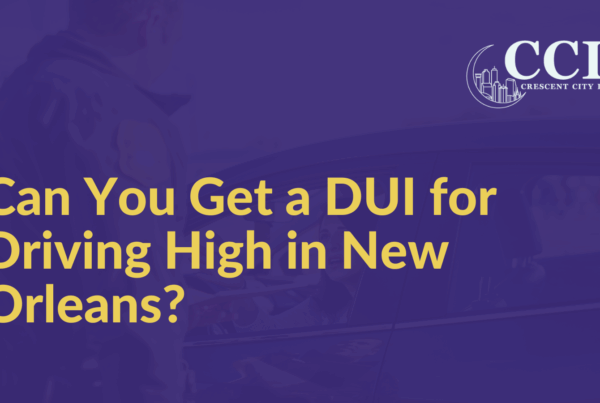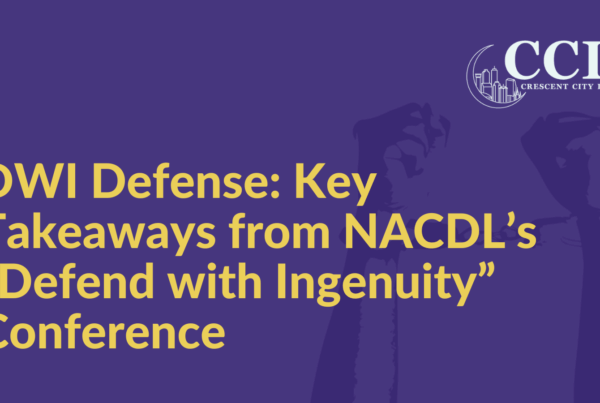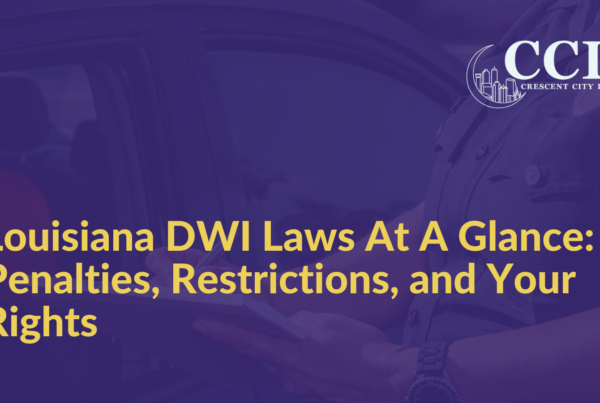New Orleans and Southern Louisiana are recognized for allowing open containers in public, keeping bars open 24 hours a day, and even hosting drive-thru daiquiri shops. Unfortunately, these freedoms may contribute to increased incidents of drinking and driving, leading to numerous consequences, including auto accidents, DUI charges, and injuries or deaths.
As a New Orleans DUI attorney, John Radziewicz‘s best advice is not to drink and drive. Despite this guidance, not everyone complies, and individuals often drive after consuming more alcohol or drugs than they should, believing they are not impaired. Many of those who drive under the influence are caught by local police.
Drawing from our extensive experience as attorneys in New Orleans, our team at Crescent City Law explains how stringent Louisiana’s laws are on drinking and driving. In this blog, he outlines what to expect if pulled over for a DUI in Crescent City.
What is the Difference Between a DUI & DWI in Louisiana?
There is no difference between a DWI and a DUI.
In Louisiana, it is generally referred to as a DWI, which means the illegal operation of an automobile, truck, aircraft, boat, or vessel while impaired by alcohol and/or drugs. If you are pulled over in New Orleans on suspicion of a DWI and charged by law enforcement, they will refer to it as “operating a vehicle while intoxicated.” Simply put, you are posing a risk to other drivers on the road.
What is the Legal Intoxication Level for Driving in Louisiana?
When you consume alcohol, it’s absorbed into your bloodstream. Your Blood Alcohol Concentration (BAC) measures the amount of alcohol in your system based on weight per unit of volume. To simplify:
- How much did you drink?
- How fast did you drink it?
- What is your body weight?
You can find approximate BAC charts online. In Louisiana, drivers under 21 are considered legally intoxicated if their BAC is 0.02 or higher. For those 21 and older, a BAC of 0.08 or higher results in a DWI charge.
How Is Your Intoxication Level Determined?
If you are 21 or older and your BAC is under 0.08, you can still face a DWI charge if the police suspect you have mixed alcohol with other drugs or medications or if the officer determines you are impaired due to alcohol consumption, regardless of your BAC.
In other words, you can be arrested and convicted of DWI in Louisiana even if your BAC is below 0.08.
Implied Consent Law: What Will Happen if I Am Pulled Over for Drinking and Driving in New Orleans?
When a driver is pulled over on suspicion of drunk driving, the police conduct an investigation. As such, everything you say will be used against you as evidence of your guilt.
It’s crucial to understand that in the United States, including Louisiana, licensed drivers have implicitly consented to submit to chemical tests—such as blood, breath, or urine—to obtain a driver’s license. This is known as the “implied consent law” (La.R.S. 32:661). These tests help law enforcement gather evidence of your intoxication.
Breathalyzer Test and Consequences
- If a driver in Louisiana consents to a breathalyzer test and their Blood Alcohol Concentration (BAC) is below 0.08, their license may not be suspended.
- A BAC of 0.08 or higher results in a 90-day license suspension and a DWI arrest.
- A BAC higher than 0.15 escalates consequences, including longer license suspensions and harsher court penalties.
- Refusing to provide a sample leads to a 365-day license suspension and a DWI arrest.
In addition to the breathalyzer test, the officer, just like in any other traffic stop, will ask you for the following:
- Driver’s license
- Insurance
- Registration
It is important to have these documents ready and current.
The officer may ask if the driver has consumed alcohol recently. While it’s advisable to cooperate with law enforcement, you should remember that you have the right to refuse to answer questions that could incriminate them. You should not exit the vehicle unless instructed by the officer.
What Are Field Sobriety Tests?
These tests are designed to gather evidence of impairment by comparing the driver’s behavior to that of a sober person. Field sobriety tests are subjective, and no guaranteed method exists to “pass” these tests.
Refusal to perform field sobriety tests often leads to an overnight stay in jail. While some may consider this, it is generally recommended not to submit to these tests.
Having an experienced Louisiana-based DWI attorney by your side can help you determine your options and help you build a strong defense strategy to get your charges dismissed. When looking to hire one, you can consider the following:
- Recommendations from family and friends
- Conduct your research and ask questions
- Look at their reviews and proven results
What if I Have Multiple Offense DUIs/DWIs in Louisiana?
Some of the penalties in Louisiana could include:
- Driving privileges are suspended for up to two years
- Court-required sobriety
- Mandatory jail time
- Up to 30 years in prison, depending on the number of repeat offenses
- Possible loss of vehicle
- Possible fines of up to $5,000
- Possible home confinement
- Possible substance abuse education or outpatient programs
- Possible felony criminal record
- Community service
Call Our Experienced New Orleans DUI/DWI Lawyer at Crescent City Law Today!
You have numerous opportunities to lessen or dismiss a DWI charge due to the various options available in and surrounding your case. If you have recently been released from jail due to a drunk driving charge in New Orleans or are currently facing DWI charges, take a few minutes to call us at (504) 264-9492 for a consultation.
John is ready to take your call or e-mail and eager to help you lessen or beat your charge. At Crescent City Law, we are here to answer your questions and take the next steps toward fighting your DWI charge and protecting your rights.






